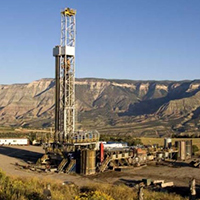
Environmental controls designed to prevent leaks of methane from newly drilled natural gas wells are effective, a study has found — but emissions from existing wells in production are much higher than previously believed.
The findings, reported today in the Proceedings of the National Academy of Sciences1, add to a burgeoning debate over the climate impact of replacing oil- and coal-fired power plants with those fuelled by natural gas. Significant leaks of heat-trapping methane from natural gas production sites would erase any climate advantage the fuel offers.
One concern is the potential release of methane during hydraulic fracturing, or 'fracking', which uses injections of high-pressure fluids to shatter rock and release trapped gas. Before production can commence, the well must be 'completed' by removal of the fracking fluids, which contain gas that can escape to the air.
To test the effectiveness of current controls, the researchers installed emissions-monitoring equipment at 27 wells during their completions in 2012 and 2013. Their results suggest that current controls reduce emissions in such wells by 99% compared to sites where the technology is not used, says lead author David Allen, an engineer at the University of Texas in Austin.
The researchers' estimate of annual emissions from wells undergoing completion, 18,000 tonnes per year, is also roughly 97% less than the estimate given in 2011 by the US Environmental Protection Agency (EPA).
Less encouraging was what the team discovered at 150 other well sites that were already producing natural gas. Such wells often use pneumatic controllers, which siphon off pressurized natural gas from the well and use it to operate production-related equipment. "As part of their normal operation, they emit methane into the atmosphere," Allen says.
His team's work suggests that emissions from pneumatic controllers and other equipment at production wells is between 57-67% higher than the current EPA estimate. However, the study also finds total methane emissions from all phases of natural gas production to be about 2.3 million tonnes per year, about 10% lower than the EPA estimate of 2.5 million tonnes…More.
Henry Jacoby, an economist and former director of the Joint Program on the Science and Policy of Global Change at Massachusetts Institute of Technology in Cambridge, agrees. "This is important work," he says, "but the great bulk of the problem is elsewhere, downstream in the natural gas system", including poorly capped oil and gas wells no longer in production.
Read the complete article here.
Reprinted by permission from Macmillan Publishers Ltd: Nature (doi:10.1038/nature.2013.13748), Copyright 2013.
Photo Credit: Steve Starr/Corbis

